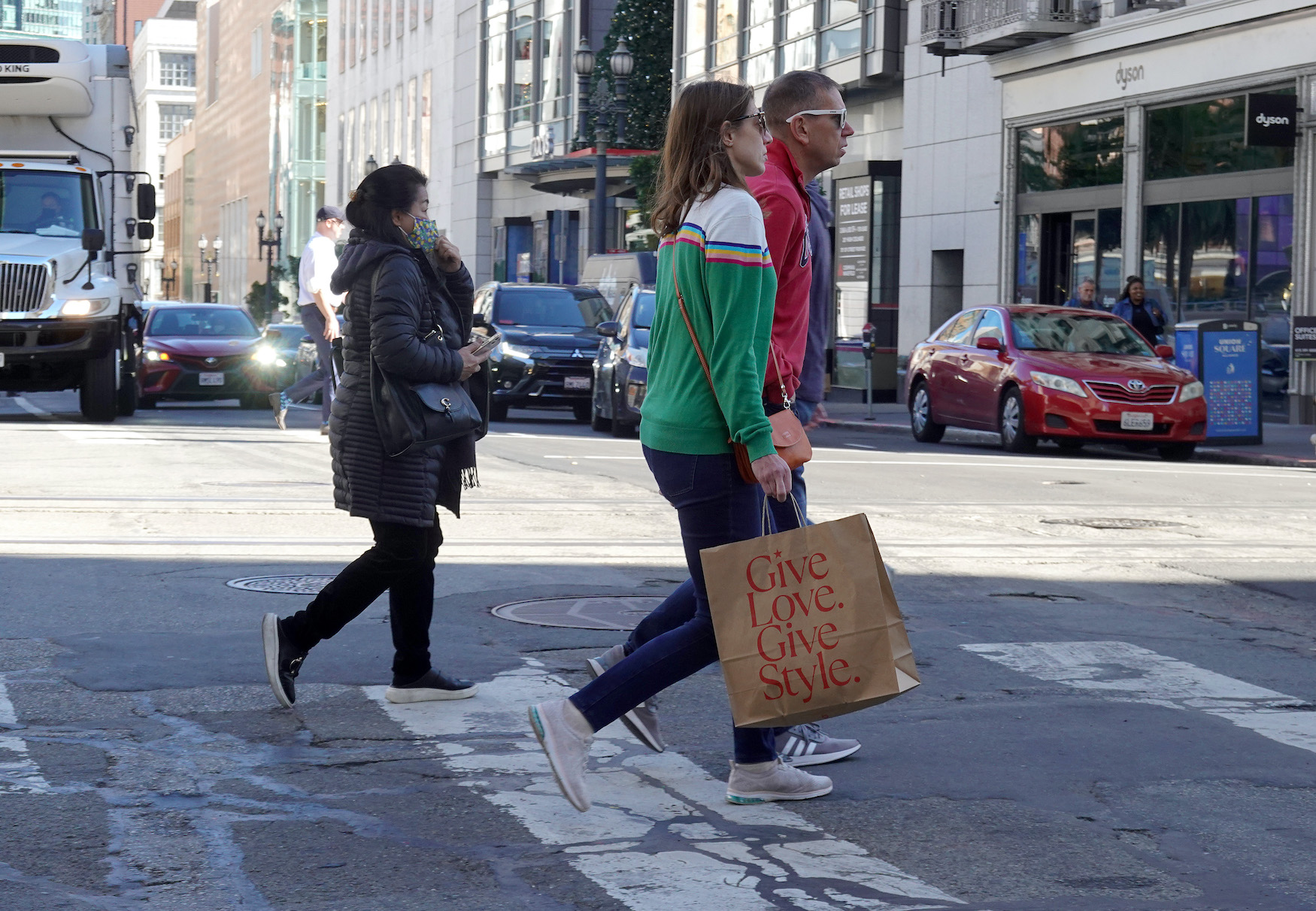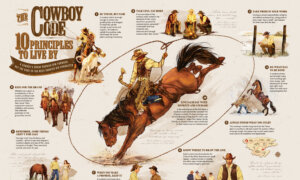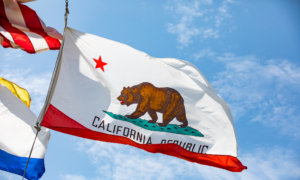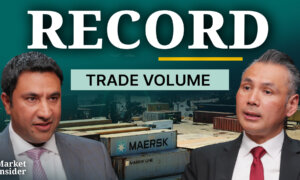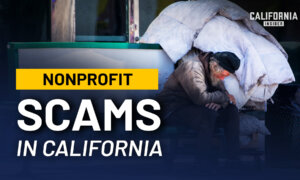California undeniably ranks among the nation’s highest-cost places to live.
The state’s cost of living in 2023 is nearly 40 percent higher than the average nationwide, according to the Missouri Economic Research and Information Center, a division of the Missouri Department of Economic Development, which also provides analysis on the economy nationwide.
According to the researchers, housing was 92 percent higher than the national average, and both utilities and transportation were more than 20 percent more expensive.
As such, a well-known scholar suggests the state is gradual shifting from the “land of opportunity.”
Victor Davis Hanson, a historian at Stanford University’s Hoover Institution, said on a recent episode of EpochTV’s “California Insider” that the state’s high cost of living stems from what he called a “utopian ideology” spawned by rapid industrial growth and an increasingly polarized social composition of extreme rich and extreme poor.
According to Mr. Hanson, California’s living cost increase is tied to a switch in the state’s industrial development and economic approach since the late 20th century.
Historically, he said, California was renowned for its abundant natural resources, thanks to its favorable geographical conditions.
“This was the most naturally wealthy state when I was growing up. ... Soil, oil, minerals, timber, weather, climate,” he said in the hour-long episode.
However, he said, that has been neglected by the leaders of the state for the past few decades.
“What did they do with that inheritance? They squandered it, and they pursued unicorns of let’s go completely [electric]. Let’s outlaw natural gas stoves. Let’s build high-speed rail, ... and we haven’t laid one foot of track for 15 years of construction,” he said.
According to recent reports, the estimated cost of the project—which runs between the San Francisco Bay Area and the Greater Los Angeles area—has increased to more than $128 billion.
Mr. Hanson also discussed the state’s goal to achieve carbon neutrality by 2045.
“We are doing massive subsidies for wind and solar, even though we know they’re terribly inefficient compared to natural gas, which is clean burning, and hydro and nuclear,” he said.
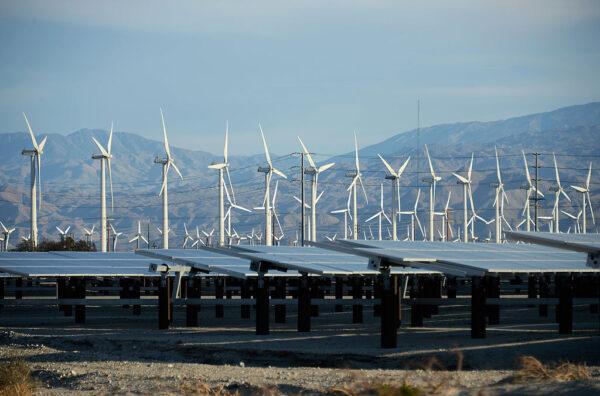
Giant wind turbines are powered by strong winds in front of solar panels in Palm Springs, Calif., on March 27, 2013. (Kevork Djansezian/Getty Images)
Mr. Hanson additionally said the state’s core economic output has changed dramatically.
“When I was born in California in 1953, the nexus of political power was Los Angeles because it had the biggest population. ... And that was built on real estate, oil development, manufacturing, defense, [but] that’s pretty much gone,” he said. “Now it’s high tech, Silicon Valley. And that type of wealth is very different.”
He added that the shift has fundamentally changed the narrative within the state and that those newer industries have “dominated the political regime in California.”
“The most obvious is that from Berkeley to La Jolla, there is an elite of 10 to 20 million people,” he said. “They’re the wealthiest of all Americans zip codes. ... They are more utopian because they’re not earthy, they’re not farming, they’re not mining, they’re not building.”
Such a “utopian ideology” has made the price of gas increase, created housing construction restrictions along some coastal regions, and made the state more expensive, Mr. Hanson said, resulting in millions of Californians leaving the state since 2020 because of the high cost of living in the name of achieving a climate-friendly society.
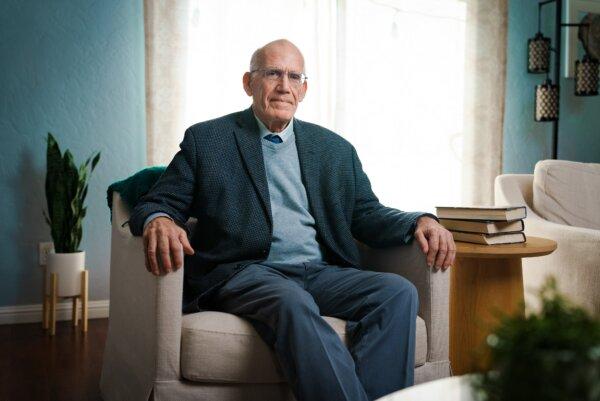
Victor Davis Hanson, classicist, military historian, and author of "The Dying Citizen," in Visalia, Calif., on Feb. 7, 2023. (York Du/The Epoch Times)
The state’s population decreased by 0.4 percent from January 2022 compared with the same period this year, dropping below 39 million residents for the first time since 2015, according to the California Department of Finance.
Such decline is unprecedented in the state’s history—as data indicate continuous growth from 1900 until 2020, when nearly 1 percent of residents opted to leave during the height of pandemic restrictions. Data show that declines have persisted since.
Another 2023 report from the United Ways of California, a nonprofit that advocates to end poverty, revealed that a family of four in San Diego County needs to earn more than $110,000 a year to meet its needs—compared with federal poverty guidelines suggesting that $30,000 is sufficient.
“We don’t have political change, because these frustrated people prefer, rather than to fight here, to go to Texas or Wyoming or Montana or Utah or Tennessee,” Mr. Hanson said. “And those are the brightest, the best, the smartest, the most capable, and the most angry, most importantly.”
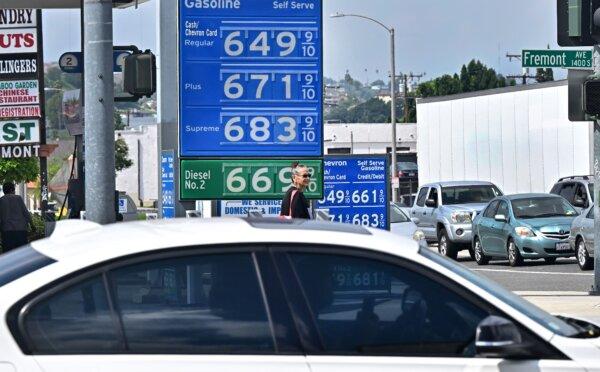
A sign displays the price of gas at more than $6 per gallon at a gas station in Alhambra, Calif., on Sept. 18, 2023. (Frederic J. Brown/AFP via Getty Images)
Additionally, he said the state is becoming like “a uniparty state” because of how many conservative voters have left in the past decade—those who most likely voted for the Republican Govs. Ronald Reagan, George Deukmejian, Pete Wilson, and Arnold Schwarzenegger.
The supermajority of Democrats in leadership roles has thrown the state out of balance, he said.
“There are no Republican statewide officeholders, no attorney general, no secretary of state, no lieutenant, nothing,” he said. “That means that any person who has an idea. ... There’s no opposition to it. Because the Republican Party is neutered.”
He additionally said the state’s mass exodus of the middle class is leading to what he called a “medieval society.”
“You put all of that together: of the Reagan voters leaving, new needier poor people coming, and massive wealth being established,” he said. “You sort of have a a medieval society where the middle class fled, the poor are subsidized, and the very wealthy ... don’t really care about the effects of the measures they enact.”
It’s incredible that such a change can happen to a state in less than two decades, Mr. Hanson said.
“Everybody flocked to California because land was cheap, there was a carefree attitude, there was a dynamic political debate back and forth, we had a viable Republican Party, and it was kind of a live and let live attitude,” Mr. Hanson said. “Now we’re sort of a nanny state. Ossified, calcified.”
